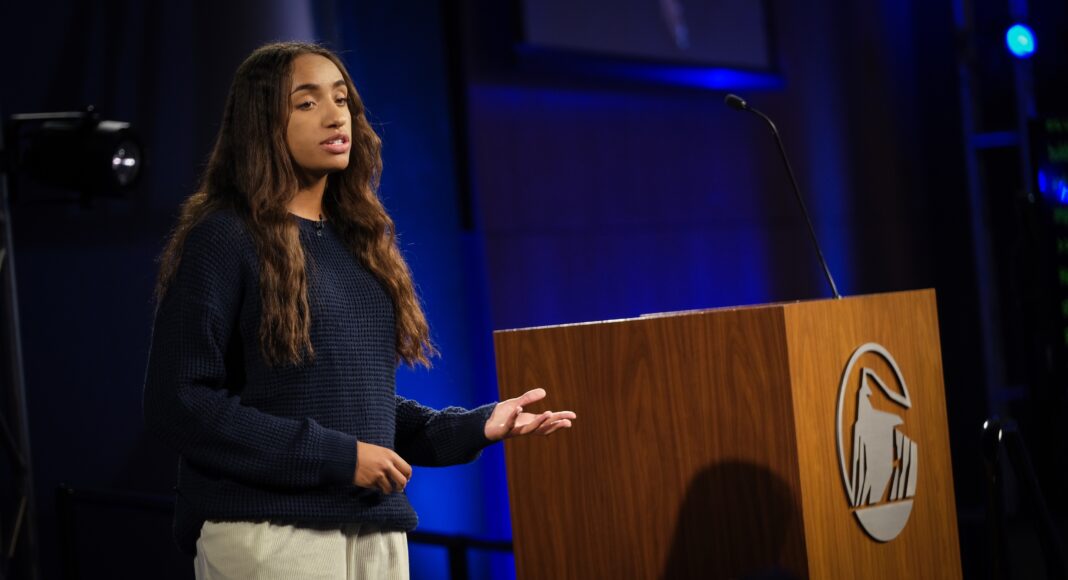“It’s my last week of school, so I’ll be going there after this,” Rachel Holmes says from her bedroom. In the background, her bed is rumpled. Illustrations paper the walls. On Zoom, Holmes has all the appearances of any 18-year-old on her way to the final week of high school—hair back, dressed and ready for a hot San Jose day—except that she just won $15,000.
Holmes was named a Prudential Emerging Visionary back in February for work on her program Black Girls Mean Business. In February, she knew she would receive $5,000 to support the program, a summer mentoring and webinar series for Black girls to gain skills in careers related to business.
Then, a few weeks ago, during a New Jersey summit for Prudential Emerging Visionaries, Holmes pitched her project on the main stage.
“They told us we had won an additional $10,000 for our program, which was insane. I wasn’t expecting to win, but I have already been able to expand my program so much since winning that money. My program was operating without any money before that point.”
Starting on July 6 and culminating in August, the workshop series comprises six Zoom meetings. Holmes facilitates the meetings herself and each meeting features two or more speakers from the business world. During meetings, participants have opportunities to connect with mentors in breakout rooms.
“The program starts with an introduction and then we go through [preparing for] college. We go through job applications and preparing for a career, and we end with goal setting and the business career panel.”
Holmes connects each girl with a mentor based upon her interest.
“I try to match them with a mentor who is in the career field that they want to go into and who has expertise in what they are looking to improve. So, if I have a girl who is starting her own business or has her own business and wants help with that, I match her with an entrepreneur. If I have someone who is interested in marketing, I’ll match with someone in marketing or advertising, et cetera.”
But Black Girls Mean Business isn’t just for girls who already know they want to be involved in business. “We have workshops that will help you transition from high school into the workplace and help you prepare for any career you are going into. They are also meant to help you fine tune the skills that you already have. We help you polish your LinkedIn pages. We help you get more comfortable with doing interviews. We help you understand your strengths and weaknesses and how you can utilize those to be successful in your career,” she explains.
For Holmes, the important thing is giving Black girls the tools and support necessary to be successful in business. Having a space specifically for Black girls helps with that. “I wanted to make sure that Black girls knew that they had a place in business and that they were represented there. I think that creating a space with all Black girls makes the girls feel more comfortable going into this career and more empowered within themselves. I also try to get speakers who are people of color. I do have a few who are not, but I try to get them to be mostly Black women and women of color to reinforce that idea—that Black women do have a space in executive positions.”
While Black Girls Mean Business focuses on Black, cisgender girls, the program does welcome Black trans girls and nonbinary folks.
Holmes adds, “I wouldn’t reject boys if they wanted to participate. The main focus that I’ve been marketing to has been Black girls.”
But her choice to focus on girls is purposeful.
“I wanted to impact these girls’ lives before they reached adulthood, before they reached that point where they were already expected to know what they wanted to do with their career. I wanted to help them earlier on in their life. It is a pretty loose term—my program encompasses girls who are aged 14 to 18. And then we are also flexible—we are allowing some middle school or early college students to join, but for the most part it is high school.”
Holmes is laying plans for Black Girls Means Business to become a registered nonprofit, a move which she says will allow the organization to have more official partnerships and funding opportunities. She will continue to work on Black Girls Mean Business while pursuing media studies at UC Berkeley this fall. Holmes’ next move is setting up a bank account for the organization so she can receive donations from those wishing to support her work. Holmes expects the money from Prudential to last awhile.
“Everyone who works for Black Girls Mean Business, from the mentors to the speakers and the team of students I have helping me out—everyone volunteers. They all donate their time,” she explains. The funds Holmes received from Prudential are going toward marketing software and digital technologies. “I was using free versions of Zoom and social media, but now I am able to expand those and really enhance the appearance of my program.”
When asked if there is a cap on registration for this summer’s program, Holmes shakes her head vigorously. She’ll find a mentor and a space for everyone: this girl means business.
Registration for this summer’s Black Girls Mean Business program is open now and closes after the second week of June. For more information, visit blackgirlsmeanbusi.wixsite.com/my-site or follow the program on Instagram.



